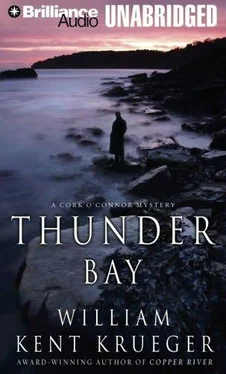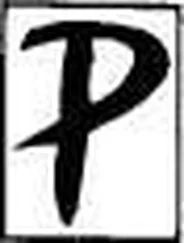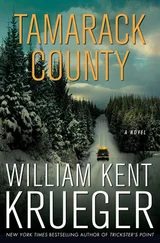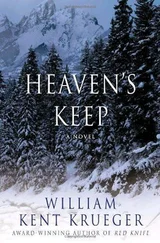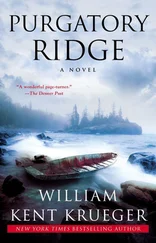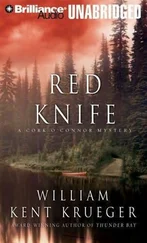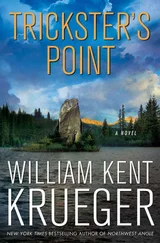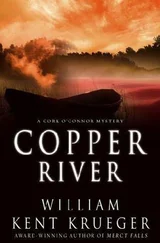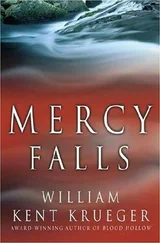William Krueger - Thunder Bay
Здесь есть возможность читать онлайн «William Krueger - Thunder Bay» весь текст электронной книги совершенно бесплатно (целиком полную версию без сокращений). В некоторых случаях можно слушать аудио, скачать через торрент в формате fb2 и присутствует краткое содержание. Жанр: Триллер, на английском языке. Описание произведения, (предисловие) а так же отзывы посетителей доступны на портале библиотеки ЛибКат.
- Название:Thunder Bay
- Автор:
- Жанр:
- Год:неизвестен
- ISBN:нет данных
- Рейтинг книги:4 / 5. Голосов: 1
-
Избранное:Добавить в избранное
- Отзывы:
-
Ваша оценка:
- 80
- 1
- 2
- 3
- 4
- 5
Thunder Bay: краткое содержание, описание и аннотация
Предлагаем к чтению аннотацию, описание, краткое содержание или предисловие (зависит от того, что написал сам автор книги «Thunder Bay»). Если вы не нашли необходимую информацию о книге — напишите в комментариях, мы постараемся отыскать её.
Thunder Bay — читать онлайн бесплатно полную книгу (весь текст) целиком
Ниже представлен текст книги, разбитый по страницам. Система сохранения места последней прочитанной страницы, позволяет с удобством читать онлайн бесплатно книгу «Thunder Bay», без необходимости каждый раз заново искать на чём Вы остановились. Поставьте закладку, и сможете в любой момент перейти на страницу, на которой закончили чтение.
Интервал:
Закладка:
Henry hadn’t looked at a book since boarding school. With Woodrow, there’d been no need.
“Listen to this,” she said. “It’s about bullfighting, about a matador named Pedro Romero, who is fighting a bull to impress a woman.” She spent a moment finding the right page, then read aloud, enunciating carefully.
“ ‘Never once did he look up. He made it stronger that way, and did it for himself, too, as well as for her. Because he did not look up to ask if it pleased he did it all for himself inside, and it strengthened him, and yet he did it for her, too. But he did not do it for her at any loss to himself. He gained by it all through the afternoon.’ ”
She finished and looked hard at Meloux, in a way that made him uncomfortable. “He is killing the bull for her. For himself, too, yes, but it is also for her. Does that make sense?”
Henry tried to think about it, but his brain was too full. Full of the young woman-her smell that was clean and flowerlike, her eyes that were like black bullets, the bones that fiercely shaped her face, the notes that made her voice sing. Her nearness, too, their knees almost touching.
“It’s by a man named Ernest Hemingway,” she went on. “Have you heard of him?”
Henry hadn’t. But he wished he had.
“What I wonder is, do men really believe that that kind of brutality is impressive to a woman?”
Henry stared at her, feeling dumb as a cow.
“It takes place in Spain and in Paris, a city in France. I was there last summer. It’s a fine place, but…” She stopped and her eyes went to the window at the front of the plane. “I like it here much better. I think what people build can be very beautiful, but what God builds goes beyond beauty. You stand outside Notre Dame, say, and you marvel at the accomplishment, but you can’t really connect. It’s artificial, do you see? It’s only a representation of something. Spirit, holiness, maybe even God. But it’s not the thing itself. Out here, it’s all there before you, around you. You’re steeped in it, the real thing. Spirit. Holiness. God.”
She was Lima’s daughter. Henry could see traces of the father in her-the slight shadow of the skin, the black hair, the slender nose- but Henry thought her mother must have been terribly beautiful. She didn’t speak like Lima. There wasn’t the odd roll to her language. She sounded little different from the whites Henry had known all his life. He wondered about that.
“I’m sorry,” she said suddenly. “Sometimes I go on and on. You’re tired, I’m sure. You probably want to sleep.”
Henry wasn’t tired, and he liked hearing her talk. But he felt tense and awkward and had a pressing need to escape for a while.
“Yes, I am tired,” he said. He closed his eyes.
He did, in fact, sleep. He woke as he heard the engine throttled back and felt the plane descending. They landed on a lake surrounded by forest, and Wellington guided the plane to shore, where a small cabin and dock had been built. The men got out, then Maria and Henry. A scruffy man who looked Indian in his features greeted Wellington, and they talked briefly, then set about refueling the plane from a metal barrel. Maria spoke to her father, who pointed toward an outhouse near the cabin. Henry walked into the woods and relieved himself. In a few minutes, they were in the air again.
It was late afternoon by the time they finally glided to rest on the shore of an immense lake contained on three sides by steep ridges. They unloaded the equipment and set up their tents. There was one for each of them. Lima and Wellington set up their own tents, located next to each other. Henry put up Maria’s. She asked for it to he as far from her father as possible because she said he snored terribly. Henry erected his own tent a bit away from the others. By the time he’d finished, the treetops had punctured the sun, and it was sinking fast. Henry canvassed the area for wood and quickly built a fire. Wellington opened a big tin of soup from the supplies that Lima had brought and heated it directly on the coals. Shortly after dark they all crawled into their tents.
Henry lay awake that night, and though he was in the middle of a vast Canadian wilderness, the sounds he heard were as familiar to him as his own breathing. The chirr of crickets and tree frogs. The creak of branches stirred by the wind. The lap of the lake against the shoreline. The smell was like home, evergreen pitch and clean water. But he was as far from home as he’d ever been, and he felt it. This was not like the government boarding school where the trees were spare and the land was flat and cultivated and smelled of manure. This was a different distance. He had the sense that he’d embarked on a long journey, without any idea of his destination.
TWENTY-FIVE
At first there was routine to the days.
After breakfast, Wellington and Lima took off with their packs full of instruments. Sometimes they used the collapsible boat they’d brought in the plane, which they called a Folbot; sometimes they struck out on foot. Always they headed toward the ridges. Usually they were gone until late afternoon, often until almost dark.
Henry’s principal job was to feed the expedition and see to the safety of the camp-and Maria. Henry didn’t wonder that Lima trusted him to be alone with his daughter. He understood clearly that Lima thought of him as little better than a stock animal-a horse or an ox, say-something to be worked hard, put up for the night, and forgotten. That his daughter might look at Henry in a different way probably never occurred to Lima. That was fine with Henry. On the plane he’d been intrigued by the young woman. When he discovered that she was his responsibility, he was no happier with the arrangement than she. Lima forbade her leaving camp unless Henry accompanied her. And Henry was forbidden to leave her alone. He was eager to explore the area and to hunt game, but when she walked in the forest, Maria made more racket than a wounded moose. Henry hated taking her with him. For several days he confined himself to camp. He dug three pit toilets-one for the white men, one for Maria, and one for himself-and constructed rudimentary seating for each using a sturdy section of limb lashed to supporting Y branches. He built a shelter suitable to eat under when it rained. Much of the rest of his time was passed fishing for walleye and trout from the lake. Maria spent the bulk of her time reading or writing in her journal and looking bored or unhappy.
“I’m sick of fish,” she declared on the fourth day, after her father and Wellington had left. “And I’m sick of sitting.” She squatted on a flat rock, half hidden by leatherleaf, at the edge of the water, and she looked across the lake at the tallest ridge. “I’m hiking up there today.”
“There are wolves,” Henry said.
It was true. He’d heard the howl of a pack at night. Mostly, though, he said it to scare her.
“Wolves don’t hunt in the day. And they won’t attack unless they believe you’re sick or infirm.”
“You read that in one of your books?”
“As a matter of fact.”
Henry had his hands in a bucket full of leeches he’d collected for fishing. “If they’re hungry, wolves will attack a bull moose in broad daylight. They’ll tear it apart.”
“I don’t believe you.”
Henry shrugged.
“I’m going.” She put down the book she’d been reading and stood up.
“I’m not ready to go,” he said.
“I don’t care.” She stomped off, following the shoreline.
Henry sighed and waited. When she was out of sight, he took up his rifle and followed, keeping himself hidden.
Henry expected her to tire quickly, but he was surprised by her endurance. The lake snaked for more than two miles to the west and Maria followed the shoreline at a steady pace. She stopped several times to drink from small streams and once to relieve herself. Henry looked away. By noon she’d reached the base of the ridge. She paused for a while, taking the measure of the height and looking, Henry supposed, for the best route up. Finally she began her ascent.
Читать дальшеИнтервал:
Закладка:
Похожие книги на «Thunder Bay»
Представляем Вашему вниманию похожие книги на «Thunder Bay» списком для выбора. Мы отобрали схожую по названию и смыслу литературу в надежде предоставить читателям больше вариантов отыскать новые, интересные, ещё непрочитанные произведения.
Обсуждение, отзывы о книге «Thunder Bay» и просто собственные мнения читателей. Оставьте ваши комментарии, напишите, что Вы думаете о произведении, его смысле или главных героях. Укажите что конкретно понравилось, а что нет, и почему Вы так считаете.
